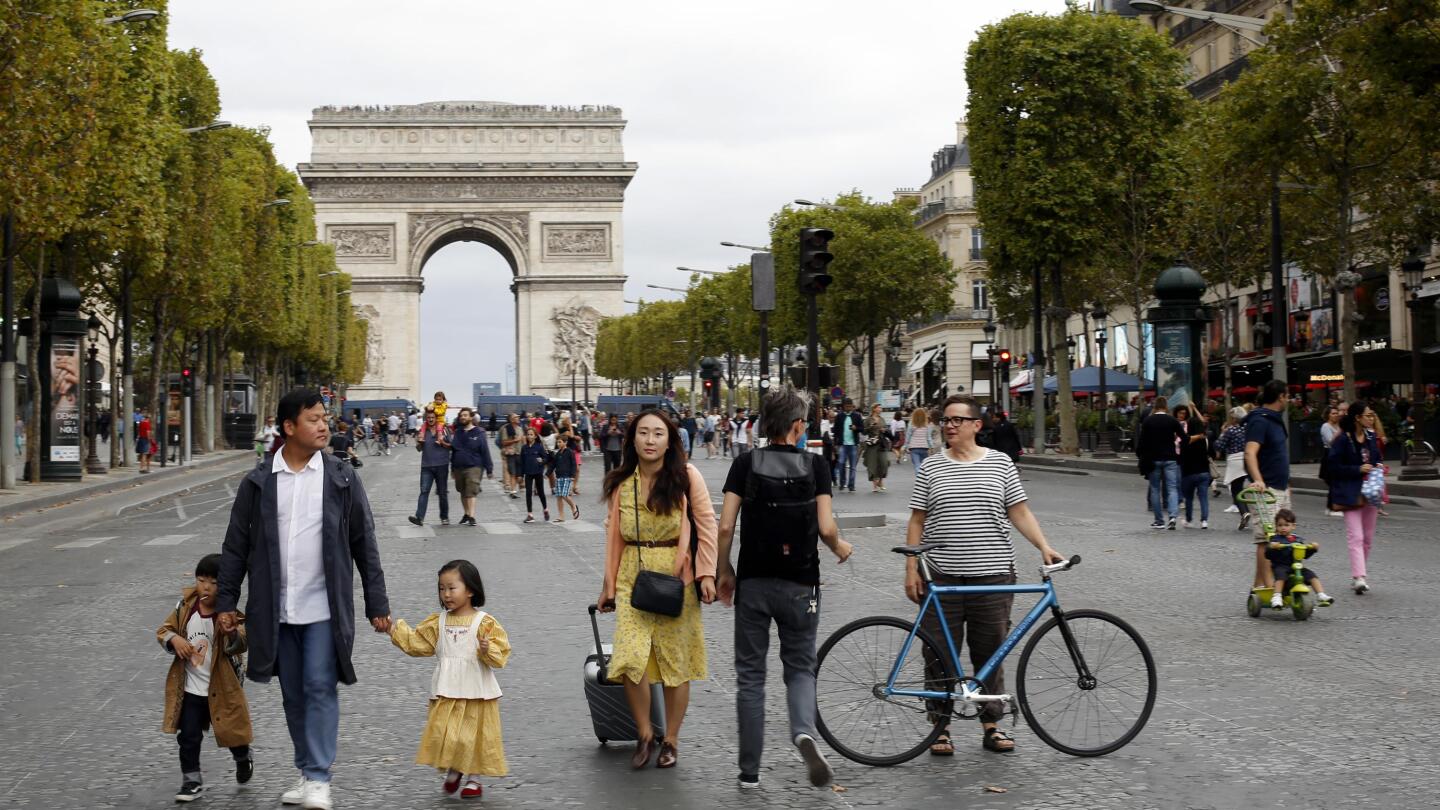deleted by creator
It absolutely isn’t. It does require rezoning so that parks, stores, and medical facilities can be better mixed in with residential.
Take a look at Amsterdam. They’re not perfect, but they’re also far closer to a more ideal city plan. Their zoning allows for mixed use, they have protected bike lanes and trails, they have comprehensive public transportation, etc.
You don’t need that dense extreme population density.
https://versus.com/en/amsterdam-vs-new-york
Amsterdam has lower population density and better walkability than New York. So population density is not automatically tied to walkability.
My girlfriend’s hometown is incredibly small 9k people. And yet you can walk to pretty much anything you like, all while owning a single family house. It is absolutely possible, and the fossil fuel execs sold you a lie that it isn’t.
deleted by creator
My girlfriend’s town actually has a pretty vibrant economy. There are local mom and pop stores everywhere, half a dozen on every street sandwiched between housing. It’s not all sunshine and daisies, but in terms of city planning it is a far, far better place to live despite being incredibly low population density.
It works there because the zoning and bylaws permit it (of course it should, the government has no place to say otherwise), that, and online shopping isn’t anywhere near as big there. So Amazon and Walmart, McDonald’s, etc can’t undercut family shops at a loss, wait for them to die then jack up prices again.
And besides, with remote jobs becoming more popular, concerns about good jobs are becoming less of an issue.
deleted by creator
far better place to live despite being incredibly low population density
I highly doubt that it’s an incredibly low population density if you actually break it up and look at just the areas you’re talking about rather than everything in the boundaries of what is considered the town. Because I highly doubt there’s any decent amount of land attached to any of those homes, or open space between them. Just because it isn’t dense compared to new york or something, doesn’t mean it’s incredibly low either.
It works there because the zoning and bylaws permit it
Also because there’s enough people there. I spent a lot of my childhood in a town of ~2000-3000. Fuck half a dozen businesses on each street, there’s barely even two streets with any amount of businesses on them, and one is just the intersection with a major interstate. And all that’s equally without the government interfering. It’s more practical to centralize what businesses there are along Main Street and just have people drive in to town when they need.
Because I highly doubt there’s any decent amount of land attached to any of those homes, or open space between them.
My neighborhood is incredibly walk-able, within 15 minutes I have:
- A beer shop
- 3 pizza shops
- 2 bars
- a hair salon
- a grocery store
- 2 churches
- a computer repair shop
- 2 parks
- 2 grocery stores
- My voting station
- A bakery
- 2 banks
- 2 international shops
- A law firm
- An auto mechanic
And most people in my area have yards, and all of this is accessible without having to cross more than 1-2 intersections as a pedestrian.
The issue isn’t just about density. People should have the freedom to choose and build higher density (which we often don’t). But on it’s own, high density is not required. At most medium density is needed, and even then not by much.
And all that’s equally without the government interfering.
It’s not just the government that can fuck shit up, corporations are equally capable. Your friendly neighborhood wally world that is at least a half hour drive away did more than it’s fair share of killing good jobs in small towns.
But even within your own example, the government almost certainly is interfering through zoning laws or prohibitions on running a business out of your home. Half the reason why my girlfriend’s neighborhood has so many shops is because so many people are running shops out of their homes.
It’s more practical to centralize what businesses there are along Main Street and just have people drive in to town when they need.
That’s an incredibly subjective view of what is practical.
What is practical is what services the most people as comfortably as possible, which as much freedom of choice as possible, and low density car-centric planning doesn’t do that. It leads to people being forced to own and maintain cars, which is expensive, it forces people to cross unsafe intersections as pedestrians, it doesn’t allow bike traffic, etc.
People should have the freedom to choose their mode of transportation. They should not be de-facto forced to use a car.
within 15 minutes I have:
Proving my point about size being a key factor. The town I lived in also had most of that stuff in a couple blocks. It’s main street, and a bit off each side. It’s enough for the whole town. Only reason more than one grocery store even exists is because there’s a Walmart out near the interstate.
It’s not just the government that can fuck shit up, corporations are equally capable. Your friendly neighborhood wally world that is at least a half hour drive away did more than it’s fair share of killing good jobs in small towns.
I was there when it came in. It really only added jobs and saved the hour drive into another city to buy shit. Casey’s was the only thing that ended up closing, and nobody missed it.
But even within your own example, the government almost certainly is interfering through zoning laws or prohibitions on running a business out of your home. Half the reason why my girlfriend’s neighborhood has so many shops is because so many people are running shops out of their homes.
I’m not interested in going and looking up civil code, but a lot of businesses were out of people’s houses. Well, “a lot” as far as there was “a lot” of anything in that town. Which isn’t all that much.
What is practical is what services the most people as comfortably as possible, which as much freedom of choice as possible, and low density car-centric planning doesn’t do that.
It does when most people live further out, and there’s only enough people to support an extremely limited amount of businesses. In that case, having a centralized area where most commerce goes on is the most comfortable for the most people, since the alternative is having to drive to multiple places instead of just one.
Proving my point about size being a key factor.
So by showing the numerous ammenitites all without going anything beyond medium density, with most of my nieghborhood having yards, that somehow proves your point? What are you talking about?
Casey’s was the only thing that ended up closing, and nobody missed it.
Sounds like your area did pretty ok, which is more than most areas can say.
It does when most people live further out
The whole point of a 15 minute city is that it is a city. This doesn’t apply to rural areas. The only reason I brought up my girlfriend’s small town is to show that density is not a controlling factor.
You know, I didn’t think it a conspracy before I read the article, but thats some good evidence. Like of course 15 minute cities are going to be used as an excuse to curb travel freedoms, it all makes with what ap news outlined. Just incentivize people with 15 minute cities, fine the non-compliers like in Oxford, make travel as inconvient and confusing as possible.
I wonder if /fuckcars is grassroots or astroturf now.
Edit: well this popped up on my feed. Methinks theres something to this. https://aussie.zone/post/2732918
Like of course 15 minute cities are going to be used as an excuse to curb travel freedoms
Cities with good city planning are no more at risk than cities with shitty city planning of travel freedoms being taken. So we may as well have good city planning that gives people as many options (freedom) as possible to choose their method of travel. Right now we don’t have that freedom, everyone is de-facto forced to own a car.
This is objectively a conspiracy theory with no supporting evidence.
fine the non-compliers like in Oxford, make travel as inconvient and confusing as possible.
Except that’s not how that fine system works:
Drivers will still be able to travel to any part of the city at any time, but may have to take a different route.
And that fine system is a completely different thing from a 15 minute city:
The 15-minute neighborhoods proposal, meanwhile, aims to ensure that “every resident has all the essentials (shops, healthcare, parks) within a 15-minute walk of their home,” the fact sheet says. The goal is to “support and add services, not restrict them.”
Having easily available services is a good thing. Not just for the planet but for our health as well.
I wonder if /fuckcars is grassroots or astroturf now.
It’s in the direct dis-interest of oil groups to allow people to exist without cars, so the opposition is astroturfed, and /r/fuckcars grassroots.
Conspiracy or not, it’s a shit idea
Having better city planning is a shit idea?
deleted by creator
I live in one, and it sucks. Everything is crowded in, land is insanely expensive, and there’s nowhere to park. Being able to walk to a store is hardly worth the downsides.


